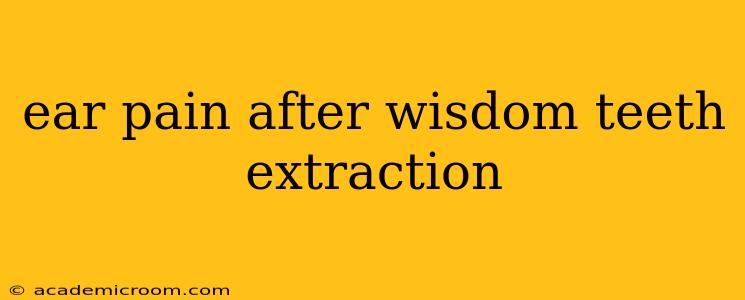Experiencing ear pain after wisdom teeth extraction is a common complication that can be both uncomfortable and concerning. While many people associate wisdom tooth removal with jaw pain and swelling, the proximity of the extraction site to the ear often leads to referred pain. Understanding the causes, effective treatments, and preventative measures can significantly ease your recovery.
What Causes Ear Pain After Wisdom Teeth Extraction?
Ear pain following wisdom tooth extraction isn't usually due to a direct problem with your ear itself. Instead, it's often a result of:
-
Referred Pain: The nerves in your jaw and ear are interconnected. Pain originating from the extraction site can be felt in your ear, a phenomenon known as referred pain. This is because the same nerve pathways transmit signals from both areas to the brain.
-
Inflammation and Swelling: Significant swelling after surgery is normal. As the area around your wisdom teeth swells, it can put pressure on the nerves that connect to your ear, leading to pain.
-
Infection: While less common with proper post-operative care, an infection at the extraction site can spread, causing increased pain that radiates to the ear. Signs of infection include increased swelling, redness, pus, and fever.
-
Sinus Issues: The proximity of your upper wisdom teeth to your sinuses means extraction can sometimes disrupt the sinuses, leading to pain that can be perceived in the ear.
-
Dry Socket: This painful complication occurs when the blood clot protecting the extraction site dislodges, exposing the bone and nerves. The pain from a dry socket can often radiate to the ear.
Why Does My Ear Hurt After Wisdom Teeth Removal? (Addressing a Common Question)
This is a frequently asked question, and the answer lies in the intricate network of nerves in your head and neck. The trigeminal nerve, for instance, innervates both the jaw and parts of the ear. Therefore, inflammation or irritation near your wisdom teeth directly impacts the signals sent along this nerve, resulting in perceived ear pain.
How Long Does Ear Pain After Wisdom Teeth Extraction Last?
The duration of ear pain varies greatly depending on individual healing rates and the presence of complications. In most cases, ear pain associated with referred pain and swelling should subside within a few days to a week. However, if the pain persists for longer, especially if accompanied by other symptoms like fever or increased swelling, it's crucial to seek medical attention.
What Can I Do to Relieve Ear Pain After Wisdom Teeth Extraction?
Managing ear pain post-extraction involves a multi-pronged approach:
-
Over-the-Counter Pain Relief: Ibuprofen or acetaminophen, as directed by your dentist, can help manage pain and inflammation.
-
Ice Packs: Applying ice packs to your jaw (not directly on the extraction site) can help reduce swelling, indirectly easing ear pain.
-
Rest: Ample rest is crucial for healing. Avoid strenuous activities.
-
Proper Oral Hygiene: Gently rinse your mouth with salt water to keep the area clean and prevent infection. (Avoid vigorous rinsing!)
-
Elevate Your Head: Sleeping with your head elevated can also help reduce swelling.
When Should I Call My Dentist or Oral Surgeon?
It's vital to contact your dentist or oral surgeon immediately if you experience:
- Severe or worsening ear pain.
- High fever.
- Increased swelling.
- Pus or discharge from the extraction site.
- Difficulty breathing or swallowing.
How Can I Prevent Ear Pain After Wisdom Teeth Extraction?
While you can't completely eliminate the risk, following your dentist's post-operative instructions diligently can significantly reduce the chances of ear pain:
- Follow all post-operative instructions carefully.
- Avoid smoking or using straws.
- Maintain proper oral hygiene.
- Keep the extraction site clean.
Remember, this information is for general knowledge and does not replace professional medical advice. Always consult your dentist or oral surgeon for personalized guidance and treatment. Early intervention can significantly improve your recovery and prevent potential complications.
